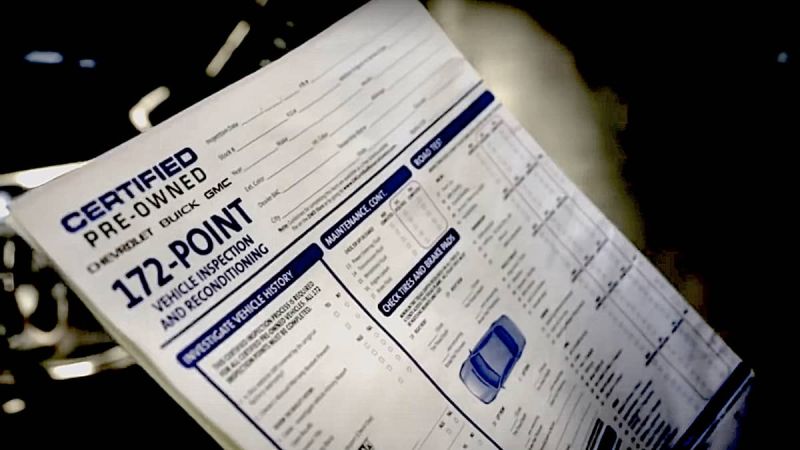CPO Vehicles
A used car with a CPO designation is one that has been vetted and deemed to be in better operating condition than its peers among similar models in the used car market.
Essentially, it offers used car buyers with something within the range of relatively new and used as a way to save money, but still own a quality vehicle. It sounds like a good idea.
The promise of buying a used previously-leased vehicle advertised with a “Certified Pre-Owned” (CPO) vehicle designation---is that you can get a relatively new, well-kept, and typically luxurious model that is already road-tested reliable and available significantly cheaper than buying it brand new.
Analysts from Consumer Reports write that, “CPO vehicles are often cherry-picked, have lower miles, and are cleaner vehicles with a clean history,” says Alex Yurchenko, senior vice president for Black Book, an automotive data and analytics company. “They’re also protected against defects and expensive repairs by an extended manufacturer’s warranty.” CPO cars may also pass a multipoint inspection to check for systems or components that may be in need of repair.
Here is a YouTube video from Kelley Blue Book about CPO vehicles:
What is Certified Pre-Owned (CPO)?---KBB Advice
All of which are attractive features in that it saves a used car buyer from the headache of worrying about whether a car is a lemon, and the hassle of having to thoroughly inspect a used car before buying it; and, it comes with a warranty and other guarantees that ensures it is a good buy.
But, is it really that good of a deal? Consumer Reports analysts say “No, it is not.”
According to a recent Consumer Reports warning, it may not be such a good buy as far as used car prices go; and, that it may not really be certified in the sense the dealer would have you to believe.
Why CPO May Not Be The Way To Go
What the CR analysts found was that even when a CPO is the real deal, it comes at a price that actually makes buying a non-certified used car a better deal for used car shoppers.
“Buying a CPO car is basically purchasing a pricey extended warranty for peace of mind against unexpected issues,” says Gabe Shenhar, associate director of CR’s Auto Test Center.
In addition, you will want to consider how much you will have to pay to insure a CPO vehicle. Depreciation on used cars typically make used car insurance much more affordable than for new cars, but with a CPO your insurer may up the coverage cost, especially for a high-end used vehicle.
“The average premium for a 3-year-old midsize car is about $850,” Yurchenko says. “For a luxury car, the average premium is about $3,000.”
The Scam Factor
Another reason why buying a used non-CPO vehicle may make better sense is that the dealership could be scamming you with his CPO sales pitch.
In fact, CR states that they have “…run across certified pre-owned cars that were not properly inspected or that turned out to have hidden damage.”
And aside from an outright scam, a CPO rating may not be real or be one of a lower value and/or of questionable authenticity. In addition, some of the promised warranty perks offered for buying the CPO vehicle could ensnarl you into a difficult warranty claim’s process should the car’s engine fail after the purchase.
CR analysts report that:
There are also various degrees of certification. A used car may be advertised as certified but may not have the backing of an official automaker’s certification program. Some dealers "certify" cars themselves or sell third-party certifications. These types of CPO programs bring risks.
Those risks can lead to having to pay for major repairs that the buyer believed were covered in the purchasing agreement with the dealership.
To protect yourself, Consumer Reports recommends that:
• Buyers need to be aware of the differences in the programs i.e. CPO certifications.
• Buyers should ask the dealer to provide full, official documentation so that you know what kind of warranty you are buying.
• Buyers should be aware that some warranties may not be transferrable from one owner to the next---especially when buying a used car from a private individual. And, that if you go the route of buying a factory-backed extended warranty with the CPO at a negotiated price, in most cases this is not a smart use of your money.
CR’s Overall Advice Concerning CPO Vehicles
Car experts at Consumer reports state that for customers looking for the best value in used cars toward saving money should be skeptical when it comes to CPO deals, and their opinion is that you are better off buying a reliable used car (available via a search through their listings) and use the saved money from buying a non-certified used car toward any repairs that may arise after the purchase.
And as always before buying a used car, be sure to it by a trusted mechanic who can confirm that all the systems and components are in order and detect any damage, hidden repairs or potential system failures that are one speed bump away.
If you have ever been scammed by a CPO vehicle purchase, please let us know about it and what happened in your experience. We do appreciate all shared comments toward helping others.
For more about care repair, maintenance and repair, be sure to check our website for the latest, useful information for the car enthusiast.
COMING UP NEXT: Protecting your car from theft; plus, a crazy car theft story.
Timothy Boyer is Torque News automotive reporter based in Cincinnati. Experienced with early car restorations, he regularly restores older vehicles with engine modifications for improved performance. Follow Tim on Twitter at @TimBoyerWrites for daily automotive repair and maintenance news.
Set Torque News as Preferred Source on Google











